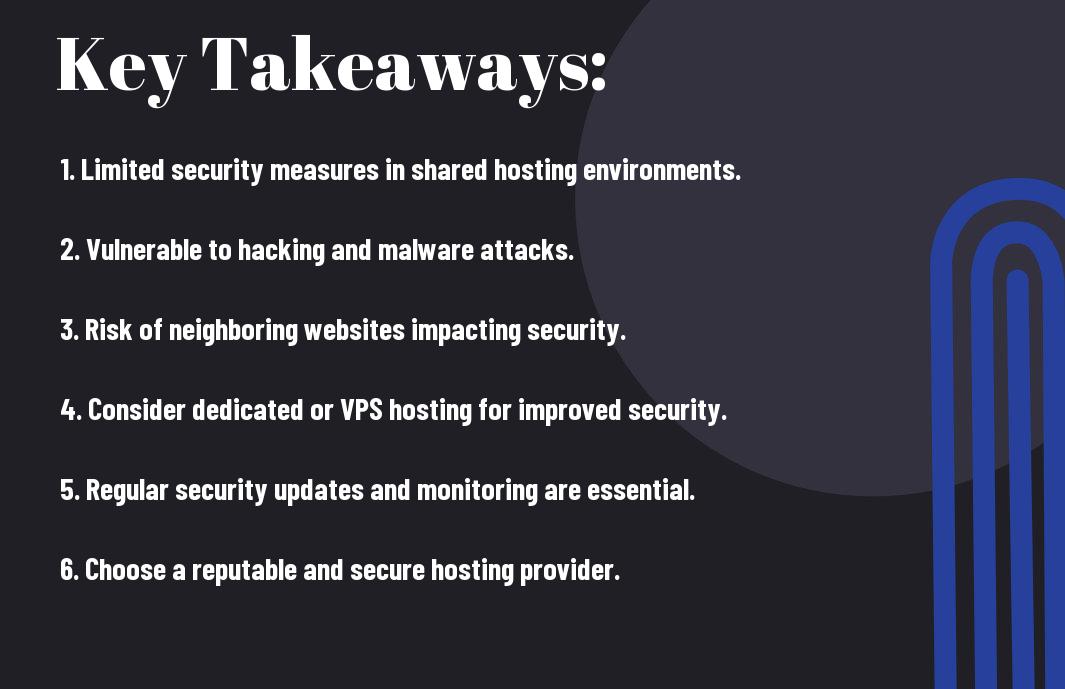Are you considering shared web hosting for your website, but concerned about the security implications? It’s important to weigh the risks and benefits before making a decision. Shared hosting can be a cost-effective solution for small businesses and individuals, but it also comes with security vulnerabilities that can leave your website at risk. When you share a server with multiple other websites, you are exposed to potential security threats from other users. However, with the right precautions and security measures in place, you can still maintain a secure website on a shared hosting platform. In this blog post, we’ll explore the security implications of shared web hosting and provide you with the information you need to make an informed decision for your website.
Key Takeaways:
- Shared web hosting can be secure – While shared web hosting may not be as secure as dedicated hosting, it can still provide robust security measures to protect your website from cyber threats.
- Regular security updates are crucial – It is important to choose a shared web hosting provider that regularly updates their security measures and patches vulnerabilities to ensure the safety of your website.
- Implement additional security measures – To further enhance the security of your website on a shared hosting plan, consider implementing measures such as using strong passwords, enabling SSL encryption, and regularly backing up your website’s data.

Understanding Shared Web Hosting
Clearly, before determining whether shared web hosting is secure for your website, it’s important to understand what it actually means. Shared web hosting refers to the practice of hosting multiple websites on a single server. This means that the resources of the server, such as CPU, RAM, and disk space, are shared among all the websites hosted on that server.
Definition and How it Works
Shared hosting works by allowing multiple websites to utilize the resources of a single server. When you purchase a shared hosting plan, you are essentially renting a portion of the server’s resources for your website. All the websites on the server share the server’s resources, which can lead to potential security risks.
Comparing Shared Hosting to Other Types
When comparing shared hosting to other types such as Virtual Private Server (VPS), Cloud Hosting, and Dedicated Server Hosting, shared hosting is the most affordable option. However, it also poses the highest security risk due to the shared nature of the server resources. The key differences between these hosting types lie in the level of control, performance, and security they offer.
- Shared Hosting: Most affordable, but highest security risk. Limited control and resources.
- VPS Hosting: Offers a higher level of control and security compared to shared hosting. It is more expensive but provides isolated resources for better performance and security.
- Cloud Hosting: Offers scalability and flexibility. Resources are spread across multiple servers, reducing the risk of downtime and improving performance.
- Dedicated Server Hosting: Provides the highest level of control, performance, and security. However, it is the most expensive option.
The level of control, performance, and security that you require for your website will determine the most suitable hosting type for your needs. The decision should be based on a careful assessment of your website’s requirements and your budget.
Security Risks Associated with Shared Hosting
Keep in mind that while shared web hosting offers a cost-effective solution for hosting your website, it also comes with its own set of security risks. When you share a server with other websites, you are also sharing the same resources and infrastructure. This can potentially expose you to security vulnerabilities and attacks that can compromise the security of your website.
Server Resource Sharing Risks
When you opt for shared web hosting, you are sharing server resources such as CPU, memory, and bandwidth with other websites hosted on the same server. This means that if another website on the server experiences a sudden surge in traffic or suffers a security breach, it can impact the performance and security of your website as well. This resource sharing can make your website more vulnerable to slowdowns, downtime, and security threats.
Potential Vulnerabilities and Attacks
Shared hosting also exposes your website to potential vulnerabilities and attacks. Since multiple websites are hosted on the same server, if one website is not properly secured, it can create a pathway for hackers to access other websites on the server, including yours. Additionally, if one website on the server gets blacklisted for malicious activity, it can negatively affect the reputation and deliverability of all the other websites on the server, including yours. This makes your website more susceptible to malware, phishing, and other security threats.
By sharing server resources and potential vulnerabilities, shared hosting can expose your website to security risks that may compromise its integrity and performance. It’s important to carefully consider these risks and take necessary precautions to mitigate them.
Securing Your Site on Shared Hosting
After considering the security risks of shared web hosting, you may be wondering how you can ensure the safety of your website. While shared hosting has its vulnerabilities, there are steps you can take to secure your site and protect it from potential threats. One common question people have is “Is Shared Hosting secure?” This can vary based on various factors including the hosting provider, the measures they take to secure their servers, and how diligently you implement security practices.
Best Practices for Enhanced Security
When it comes to enhancing the security of your site on shared hosting, there are several best practices you should implement. First and foremost, make sure that all software, including your CMS, plugins, and themes, are regularly updated. This is crucial as outdated software can be exploited by attackers to gain unauthorized access to your site. Additionally, using strong and unique passwords for all your accounts is essential. Enabling two-factor authentication adds an extra layer of security, helping to protect your site even if your password is compromised. Regularly backing up your website’s files and database is also important. In the event of a security incident, having a recent backup can save you from losing valuable data.
Tools and Measures for Protection
There are various tools and measures you can employ to enhance the protection of your site on shared hosting. Consider using a web application firewall (WAF) to filter and monitor incoming traffic to your website, blocking malicious requests and preventing attacks. Implementing secure socket layer (SSL) encryption is also critical, especially if your website handles sensitive information like payment details. Your hosting provider may offer security features such as malware scanning and removal, DDoS protection, and server monitoring. These can help safeguard your site from common threats and vulnerabilities.

Evaluating Shared Hosting Providers
Not all shared hosting providers are created equal when it comes to security. It’s crucial to thoroughly evaluate the security measures offered by each provider before making a decision. You want to ensure that your website is protected against potential threats and vulnerabilities. To help you find the most secure web hosting for your website, you can refer to CyberNews’s article on Most Secure Web Hosting 2023: Worry-free And Safe Hosting.
Criteria for Assessing Security Features
When evaluating shared hosting providers, there are several key factors to consider to ensure your website’s security. Look for providers that offer regular security updates and patches to protect against the latest threats. Additionally, firewall protection and malware scanning are essential features to prevent unauthorized access and detect malicious software on your website. It’s also important to consider DDoS protection to mitigate potential attacks that could disrupt your website’s availability.
Making an Informed Decision
Ultimately, the security of your website is in your hands. After evaluating the security features offered by shared hosting providers, you must make an informed decision that aligns with your security requirements. Remember to prioritize reputation and reliability when choosing a provider, as this can directly impact the security of your website. By carefully considering these factors, you can confidently select a shared hosting provider that prioritizes the security and protection of your website.
Is Shared Web Hosting Secure for Your Website?
So, is shared web hosting secure for your website? The answer depends on the specific hosting provider and the measures they take to ensure the security of their shared hosting servers. While shared web hosting can be cost-effective and convenient, it also comes with its own set of security risks. If you choose a reputable hosting provider that regularly updates their security protocols and offers additional security features such as SSL certificates and DDoS protection, then shared web hosting can be a secure option for your website. However, it is important to regularly monitor and update your website and be mindful of the activities of other websites sharing the same server. By taking proactive measures and staying informed about your hosting provider’s security practices, you can help ensure the security of your website on a shared hosting plan.
Is Shared Web Hosting Secure for Your Website? – FAQ
Q: What is shared web hosting?
A: Shared web hosting is a type of hosting where multiple websites are hosted on a single server. This means that resources such as CPU, disk space, and bandwidth are shared among all the websites on the server.
Q: Is shared web hosting secure for my website?
A: Shared web hosting can be secure, but it depends on the hosting company and their security measures. While the server is secure, there is always a risk of other websites on the server being compromised and affecting your site. It’s important to choose a reputable hosting company with robust security measures in place.
Q: What security measures should I look for in a shared web hosting provider?
A: Look for a hosting provider that offers features such as SSL certificates, regular security updates, malware scanning and removal, firewalls, and secure data centers. Additionally, check if they provide regular backups and have a solid track record for addressing security vulnerabilities.
Q: Are there any specific risks associated with shared web hosting?
A: One of the main risks of shared web hosting is the potential for cross-site contamination. This occurs when one compromised website on the server can affect other websites. Additionally, if a website on the server experiences a sudden surge in traffic, it can impact the performance of other websites on the server.
Q: How can I further secure my website on a shared web hosting plan?
A: To further secure your website, you can implement additional security measures such as using strong passwords, keeping your software and plugins updated, and regularly monitoring your website for any suspicious activity. It’s also advisable to consider investing in a dedicated IP address and a virtual private server (VPS) hosting plan if your website handles sensitive information or experiences high traffic.
CATEGORY:Web Hosting

